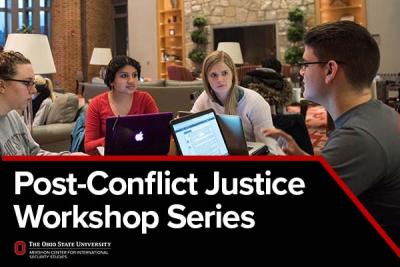Undergraduate Post-Conflict Justice Workshop Series

Overview
The Mershon Center for International Security Studies is happy to announce its inaugural Post-Conflict Justice Workshop Series. During this hands-on, six-week program, undergraduate students will learn about the field of transitional justice—different forms of accountability, legal and other reform, and reconciliation during the transition away from war, authoritarianism, or legacies of discrimination.
This multi-event workshop, convening once weekly starting the week of March 21, aims to introduce students to the field of transitional justice from multiple perspectives - bottom-up and top-down - including survivors, NGOs, donors, armed actors, and governments. To layer perspectives and insight into needed skills in this field, each week will cover a different topic.
The workshop series will discuss the following questions, among others:
- What approaches to short- and long-term accountability and reconciliation do countries implement after conflict?
- How does a country reconcile the demands of survivors for aid and justice with the needs of former armed actors to reintegrate into society?
- Which institutions advocate, fund, lobby, and create policy around truth-seeking, prosecutions, reparations, and justice?
- Does the form of justice turn on whether the society is transitioning from authoritarianism, civil conflict, or legacies of legal or structural discrimination?
- Which goals are in competition with each other? What are the main challenges of the field of justice after transition?
- How could I prepare for a career in policy or programming focused on building peace and institutions?
Over the workshop series, students will have the opportunity to participate in simulations, ask practitioners in the field questions, visualize how different issues and stakeholder groups connect, and walk away with insight into careers and next-steps.
Participate
Space for this program will be limited to 20 students. Successful applicants will be expected to participate in weekly sessions (held virtually or in person depending on participant preference) and will receive a certificate of completion at the end of the program. Any undergraduate with an interest in the field of transitional justice is able to apply.
Applications will be accepted until March 6 at 5 p.m. EST.
ABOUT TRANSITIONAL JUSTICE
The modern story of "transitional justice" starts with the post-WWII Nuremburg Trials, modern history's first international war crimes tribunal, which disclosed the magnitude, motives, and types of German atrocities, sentencing many NAZI leaders and finding others not guilty. Since the 1940's, countries have experimented with different approaches to justice, such as hybrid (international-domestic law) trials, truth commissions, reparations, searches for the disappeared, the removal of implicated public officials from office, and museums and other centers of learning at the site of torture chambers and other sites of conscious. Countries have also innovated with the ways to gather, record, preserve, and disseminate information about human rights abuses—whether through reports, judicial opinions, archives, and so forth. The field is complex and riddled with shortcomings, but hopefully this first dive spurs interest, bonds, and a further understanding of how Ohio State's Mershon Center can contribute to undergraduate understanding of the field.
